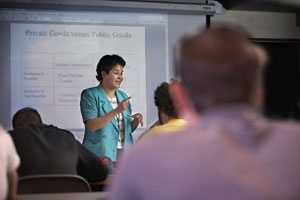New program will allow students to develop sustainable water and sanitation systems in Honduras
 Sharon Jones
Sharon Jones, professor of civil and environmental engineering and director of the engineering division, has received a $149,775 International Research Experiences for Students grant from the National Science Foundation.
Funded through the American Recovery and Reinvestment Act of 2009, the grant enables a collaboration between Lafayette and the international staff of Water for People (WFP), located in San Pedro Sula, Honduras.
For the next three summers, Jones will travel to Honduras with groups of Lafayette students to develop sustainable water and sanitation systems in rural areas of the country.
This project is closely related to the work members of Lafayette’s chapter of Engineers Without Borders (EWB) have performed in Honduras. Since 2003, EWB students have been developing sustainable water systems for the villages of El Convento, Lagunitas, and La Fortuna in the Yoro district of central Honduras. The group’s work garnered national media exposure for being one of six national institutions to receive a $75,000 grant from the Environmental Protection Agency.
Jones explains that WFP is one of the leading nongovernmental organizations addressing the water and sanitation needs in developing countries. “I have respected their approach for many years, and I reached out to them. Fortunately, it was around the time they were looking to develop college partnerships,” she says.
Different students will be selected to participate in each of the trips based on a competitive application process during the spring semester. The project will actively recruit minority students from Lafayette’s Posse Scholars program for urban students and the Minority Scientists and Engineers organization.
In preparation for the trips, students will take language and cultural classes and spend time early in the summer learning the research methods they will use in the field.
In Honduras, Lafayette students will work alongside civil engineering students from the National Autonomous University of Honduras, a representative of the WFP Central America regional office in Honduras, and Honduran engineers with extensive rural infrastructure experience. The student research projects will include data collection of sustainability indicators, comparison of the data sources and measurement techniques, and development of sustainable solutions to difficult water and sanitation problems.
Following the four-week trips, the students will spend another four weeks back on campus analyzing the data they collect in Honduras. They will be able to use videoconference sessions to communicate with the National Autonomous University students as they process the information together. Additionally, the students will prepare presentations of their work for local high school classes to demonstrate that engineering is a service-oriented career.
Given the political turmoil in Honduras, Jones will be working closely with WFP and following travel advisories issued by the U.S. State Department. “We are hoping that things settle down so that the program is not affected,” she says.
